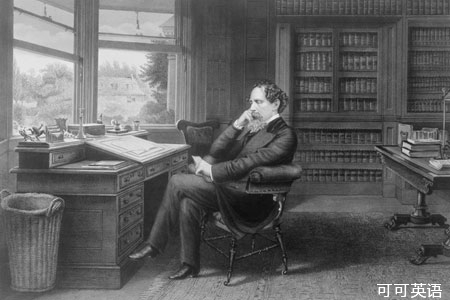(单词翻译:单击)
名著阅读
'I suppose it is. Everybody says so.'
'Your cousin Feenix raves about it, Edith,' interposed her mother from her couch.
The daughter slightly turned her graceful head, and raising her eyebrows by a hair's-breadth, as if her cousin Feenix were of all the mortal world the least to be regarded, turned her eyes again towards Mr Dombey.
'I hope, for the credit of my good taste, that I am tired of the neighbourhood,' she said.
'You have almost reason to be, Madam,' he replied, glancing at a variety of landscape drawings, of which he had already recognised several as representing neighbouring points of view, and which were strewn abundantly about the room, 'if these beautiful productions are from your hand.'
She gave him no reply, but sat in a disdainful beauty, quite amazing.
'Have they that interest?' said Mr Dombey. 'Are they yours?'
'Yes.'
'And you play, I already know.'
'Yes.'
'And sing?'
'Yes.'
She answered all these questions with a strange reluctance; and with that remarkable air of opposition to herself, already noticed as belonging to her beauty. Yet she was not embarrassed, but wholly self-possessed. Neither did she seem to wish to avoid the conversation, for she addressed her face, and - so far as she could - her manner also, to him; and continued to do so, when he was silent.
'You have many resources against weariness at least,' said Mr Dombey.
'Whatever their efficiency may be,' she returned, 'you know them all now. I have no more.
'May I hope to prove them all?' said Mr Dombey, with solemn gallantry, laying down a drawing he had held, and motioning towards the harp.
'Oh certainly) If you desire it!'
She rose as she spoke, and crossing by her mother's couch, and directing a stately look towards her, which was instantaneous in its duration, but inclusive (if anyone had seen it) of a multitude of expressions, among which that of the twilight smile, without the smile itself, overshadowed all the rest, went out of the room.
The Major, who was quite forgiven by this time, had wheeled a little table up to Cleopatra, and was sitting down to play picquet with her. Mr Dombey, not knowing the game, sat down to watch them for his edification until Edith should return.
'We are going to have some music, Mr Dombey, I hope?' said Cleopatra.
'Mrs Granger has been kind enough to promise so,' said Mr Dombey.
'Ah! That's very nice. Do you propose, Major?'
'No, Ma'am,' said the Major. 'Couldn't do it.'
'You're a barbarous being,' replied the lady, 'and my hand's destroyed. You are fond of music, Mr Dombey?''Eminently so,' was Mr Dombey's answer.
'Yes. It's very nice,' said Cleopatra, looking at her cards. 'So much heart in it - undeveloped recollections of a previous state of existence' - and all that - which is so truly charming. Do you know,' simpered Cleopatra, reversing the knave of clubs, who had come into her game with his heels uppermost, 'that if anything could tempt me to put a period to my life, it would be curiosity to find out what it's all about, and what it means; there are so many provoking mysteries, really, that are hidden from us. Major, you to play.'
The Major played; and Mr Dombey, looking on for his instruction, would soon have been in a state of dire confusion, but that he gave no attention to the game whatever, and sat wondering instead when Edith would come back.
She came at last, and sat down to her harp, and Mr Dombey rose and stood beside her, listening. He had little taste for music, and no knowledge of the strain she played, but he saw her bending over it, and perhaps he heard among the sounding strings some distant music of his own, that tamed the monster of the iron road, and made it less inexorable.
Cleopatra had a sharp eye, verily, at picquet. It glistened like a bird's, and did not fix itself upon the game, but pierced the room from end to end, and gleamed on harp, performer, listener, everything.
When the haughty beauty had concluded, she arose, and receiving Mr Dombey's thanks and compliments in exactly the same manner as before, went with scarcely any pause to the piano, and began there.
Edith Granger, any song but that! Edith Granger, you are very handsome, and your touch upon the keys is brilliant, and your voice is deep and rich; but not the air that his neglected daughter sang to his dead son)
Alas, he knows it not; and if he did, what air of hers would stir him, rigid man! Sleep, lonely Florence, sleep! Peace in thy dreams, although the night has turned dark, and the clouds are gathering, and threaten to discharge themselves in hail!
"我想是的,人人都这么说。"
"你的表哥菲尼克斯对它喜欢得就像入了迷似的,伊迪丝,"她的母亲从长沙发椅中插嘴道。
女儿轻微地转过她那美丽的头,稍稍扬起眉毛,仿佛她的表哥菲尼克斯是尘世间最不值得注意的人似的;她的眼睛又转向董贝先生。
"考虑到我审美能力的声誉,我希望我对附近的地方都已厌倦了,"她说道。
"您也许很有理由觉得这样吧,夫人,"他朝大量散摆在房间四处的各种风景画看了一眼,说道;他已看出其中有几幅是描写附近的景致的,"如果这些美丽的作品是出于您的手笔的话。"
她没有回答他,而是以目空一切的美人的姿态,十分惊异地坐在那里。
"是不是这样?"董贝先生问道,"它们是不是您画的?"
"是的。"
"您还会弹琴,我早知道了。"
"是的。"
"还会唱歌吧?"
"是的。"
她用奇怪的、勉强的口吻回答这些问题,并露出跟自己对抗的神情;前面已经指出,这是她的美貌的一个特点。可是她并不局促不安,而完全是泰然自若。她似乎也并不希望避开谈话,因为她的脸朝着他,她的态度也尽可能地注意着他;当他沉默的时候,她也依然如此。
"您至少有许多方法来排遣烦闷,"董贝先生说道。
"不管它们的效果怎么样,"她回答道,"这些方法现在您全都知道了。我没有什么别的方法。"
"我可以希望把它们的效果全部证明一下吗?"董贝先生放下手中的一幅图画,指着竖琴,庄严而又殷勤地问道。
"啊,当然可以,如果您愿意的话。"
她一边说,一边站起来;当她走过母亲的长沙发椅时,她向那里投去了庄严的眼光,时间是短促的一瞬,但它却包含了许多表情,其中那若隐若现的微笑把其余的表情都遮蔽了;——她就这样走出了房间。
少校这时得到了完全的宽恕;他把一个有轮子的小桌子推到克利奥佩特拉身旁,坐下来跟她玩皮基特牌。董贝先生不懂得玩这种纸牌;当伊迪丝没有回来的时候,他就坐下来看他们玩,从中学习。
"我希望,我们将听到音乐吧,董贝先生?"克利奥佩特拉说道。
"承蒙格兰杰夫人的厚意,她已经答应了,"董贝先生说道。
"啊,好极了。是你建议的吗,少校?"
"不是,夫人,"少校说,"我提不出这样的建议。"
"你是个野蛮人,"那位夫人回答道,"我的手气都给你败坏,打不出好牌来了。您喜欢音乐吧,董贝先生?"
"非常喜欢。"这是董贝先生的回答。"是的。好极了。"克利奥佩特拉看着纸牌,说道,"音乐包含着许多心,它使人模糊地回想起人类往昔的生存状态——还有很多别的东西,那确实是多么可爱。您可知道,"克利奥佩特拉窃笑着,一边把抓进来的那张脚朝天的梅花杰克掉过头去,"如果有什么东西诱使我结束我的生命的话,那就是想要了解我们周围的一切究竟是什么、它的意义究竟是什么的好奇心;确实,有那么耐人寻味的秘密隐藏着,我们还不知道。少校,你出牌!"
少校出了牌;董贝先生继续看着,从中学习,他本来很早就已完全看不明白了,可是他根本没有注意玩牌,而是坐在那里纳闷:伊迪丝什么时候才会回来呢。
她终于回来了,并且在竖琴前面坐下来;董贝先生站起身来,站在她旁边,听着。他对音乐没有什么欣赏力,对她弹奏的曲调一无所知,但是他看见她向竖琴弯下身子,也许他还在琴弦的声音中听到在什么遥远的地方响起了他自己的音乐;它驯服了铁路这个怪物,使它不像过去那么难以抗拒了。
克利奥佩特拉玩皮基特牌的时候,眼睛确实敏锐。它们像鸟儿的眼睛一样闪着光,而且没有死死盯在纸牌上,而是注视着整个房间,从这一端到那一端,毫无疏漏。它们的光闪射到竖琴上,闪射到弹琴人的身上,闪射到听琴人的身上,闪射到每一样东西上。
傲慢的美人弹完之后,站起来,用跟先前一样的态度接受了董贝先生的感谢与恭维;然后几乎没有停歇地走向钢琴,开始弹奏起来。
伊迪丝·格兰杰,您不论弹唱哪首歌曲都可以,但请别弹唱这首歌曲吧!伊迪丝·格兰杰,您是很标致的,您的指法是出色的,您的声音是深沉和嘹亮的,但是请您别弹唱他的受冷落的女儿曾经唱给他的死去的儿子听的这首歌曲吧!
啊,他没有听出来;如果他听出来的话,还有什么歌曲能像这首歌曲那样,会把他这冷酷的人搅得心神不宁呢!安睡吧。孤独的弗洛伦斯,安睡吧!虽然夜已经黑了,乌云正在密布,好像就要下冰雹了,但祝愿您的梦是安宁的!
背景阅读

本书简介:
《董贝父子》是狄更斯最重要的作品之一,发表于1848年。小说描写了董贝父子公司的盛衰史。董贝是个贪得无厌的大资本家,妻子儿女都成了他追逐利润的工具和摆设。公司经理卡克尔是个奸诈小人,骗取了董贝的信任后又一手造成了他的破产。在现实的教训中,董贝的思想发生了转变。最后,虽然他已无法重整家业,却成全了真正的家庭幸福。
作者简介:
英国小说家查尔斯·约翰·赫芬姆·狄更斯(Charles John Huffam Dickens,1812年2月7日~1870年6月9日) 英国维多利亚时期的著名小说家,他的作品至今依然盛行,并对英国文学发展起到重要影响。 狄更斯1812年出生于英国朴次茅斯(Portsmouth),是海军职员约翰·狄更斯和伊丽莎白·巴洛所生的第二个孩子。狄更斯5岁时全家就迁居占松(Chatham),10岁时又搬到康登镇(Camden Town)。 小时候狄更斯曾经在一所私立学校接受过一段时间的教育,但是12岁时,狄更斯的父亲就因债务问题而入狱,狄更斯也因此被送到伦敦一家鞋油场当学徒,每天工作10个小时。或许是由于这段经历,使得狄更斯的作品更关注底层社会劳动人民的生活状态。 不过后来由于父亲继承了一笔遗产而令家庭经济状况有所好转,狄更斯也才有机会重新回到学校。15岁时他从威灵顿学院毕业,随后进入一家律师行工作,后来又转入报馆,成为一名报导国会辩论的记者。狄更斯并没有接受很多的正规教育,基本上是靠自学成才。

